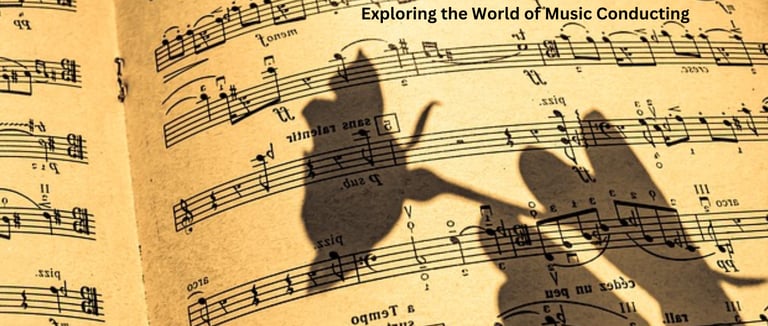Exploring the World of Music Conducting Essential Reading Materials
1/24/20254 min read


"Exploring the World of Music Conducting: Essential Reading Materials"
A synthesis of technical veracity combined with interpretive acumen and leadership caliber, and thus, it is an art. Conductors are to command the whole range of ensembles-from symphonic and choral forces to the wind band and chamber music performance. Such a multi-dimensional role shall stimulate the adventurous souls who venture into this journey in the conducting world. Luckily, there are enough books on reading to bring a beginner and an experienced conductor closer to mastering this art. Let's look at some basics in conducting music and enlighten some of the books expanding various topics on this activity.
The Task of a Conductor
Or, a conductor leads a few individuals. This is not waving the baton; that is just a gesture, after all-but, but far more inclusive, beyond and including:
Translating Score: Interpretive sense of composer's message: how it must be done. Rehearse Leadership: technical solution problems balance sections into a whole.
Help the performer express himself or herself through playing, but not at the expense of performance accuracy. All these are done in the context of performance theory, history, and practice and require highly developed human relations skills.
Critical Skills of Conductors
Conducting involves technical skills as well as interpersonal skills. Some of the areas that make perfect good conducting include:
Score reading and interpretation: All the details of the score, harmony and orchestration of phrasing and dynamic Baton techniques: Clarity in the definition of the gesture to be indicated tempo, dynamic, and phrase Leadership and Team: Developed trust but had to assert control Aural: Problems of balance and intonation, and getting the ensemble over problems in rehearsal Flexibility: Ability to modulate to take care of changing requirements of diverse ensembles, venues, and repertoires.
Text on Conducting Instruction
Theory of Conducting and Conducting Practice
"The Grammar of Conducting" by Max Rudolf
This is traditionally a textbook. It works with extremely simple beat patterns and up through nuance in interpretation. It is a must-have for every conductor who has aspirations to continue or begin, from Greenhorn novice to seasoned master.
"Basic Conducting Techniques" by Joseph A. Labuta
This is an introduction book with some basic baton techniques and practising methods. It is excellent for newbies as it provides a crystal-clear exercise method.
"The Modern Conductor" by Elizabeth A. Green
It is the traditional one from the olden days. The book covers using the full potential of the technical guidelines to prepare scores and rehearsing techniques. It really comes in handy for conducting not only an orchestra but also a choir.
Score Study and Analysis
"The Art of Conducting" by Donald Hunsberger and Roy Ernst
It is designed as a study book to facilitate teaching about musical form and to be used as a precursor to interpretations.
"Score and Rehearsal Preparation," by Gary Stith
Since the book comes more practically on that orientation of producing productive work for scoring or rehearsal preparation for effectiveness to the conductor
"Inside Conducting, by Christopher Seaman
Sheds technical guidelines by an expert himself and personal accounts of insight within the work of a conductor.
This book by one of the outstanding conductors about historical and Philosophical perspectives,
"The Maestro Myth " Norman Lebrecht
Exposing society and the whole art of music to live through the life histories and careers of the world's most excellent conductors,
"Conducting Business: Unveiling the Mystery behind the Maestro" Leonard Slatkin.
A memoir, the other part almost instructive in casting a light on the conducting's work.
"The Compleat Conductor" by Gunther Schuller
A comprehensive collection of material on work for interpretation and actual comparison of work over records and live actual performances
Thematic Topics
"Choral Conducting: Philosophy and Practice" by Colin Durrant
Choral directors will want this book with ideas about Leadership in vocal ensembles, plus pointers toward actualities
"Band Director's Complete Handbook" by Donald E. Canedy
This is the only source on the subject matter of the wind band conductor, which should be put on conducting and repertoire choice with an added requirement on rehearsal planning.
"Conducting Contemporary Music" by Alan Hazeldine
This is something every conductor wants, as he will look for a topic for discussion about everything that comes into his job as a conductor handling contemporary scores.
Videos and Tutorials: Now go through some of these videos from world-renowned conductors, be it Leonard Bernstein or Gustavo Dudamel, just to get inspiration or learn.
Masterclasses: At this stage, a conductor moves further by taking masterclasses or even online classes and workshops to learn from a master.
Podcasts and Interviews are listened to where conductors are speaking during interviews of the stories they narrate, telling why they had conceptualized it through personal experiences.
Sheet Music and Scores have scores in various genres that enhance an enlightened evaluation.
Guidelines for future Conductors
Perform with chamber groups or students' orchestras to gain strength and experience.
Learn lessons from Conductors whom he might think could appraise him in totality. Use a mirror or recording clearly in sight and vision of gesture.
Be curious, and more importantly, learn many repertoire in diverse musical genres for one's eye to expand. Discuss anything that comes along with your ensemble or team. A good working team has to comprise a good cooperating situation. It is a a life-long learning exercise for one. There is literature which would provide, at least, most elementary reading materials- fromhnical how-to's and philosophical thought- that great draws of resources on for aspiring conductors. When there's much information one has, on top of the experience of the conductors and down-to-earth managerial practices, their performance will be the perfect art from the musicians when trying to commit some unforgettable performances. There is enough literature, from developing to mastery ability, that the conductor can source on the topic.







